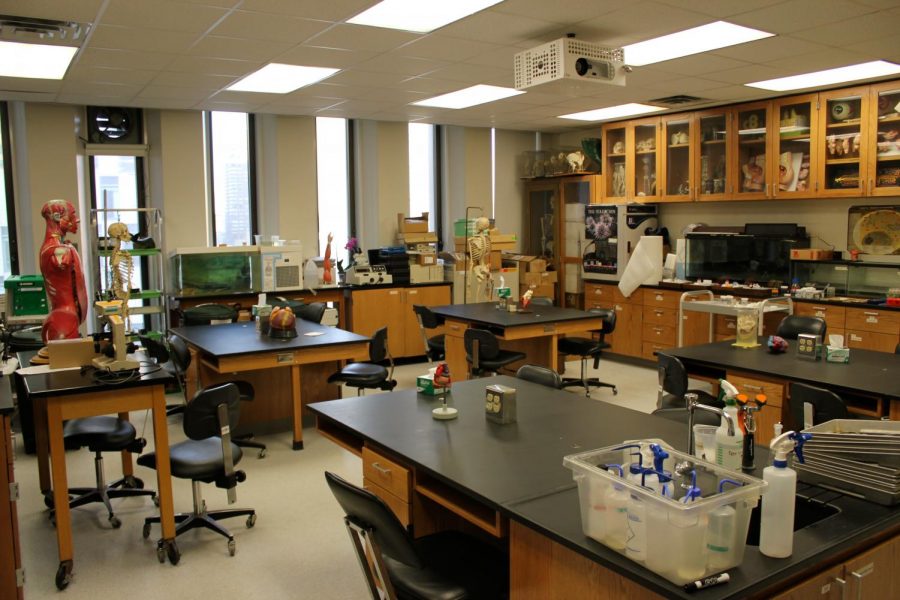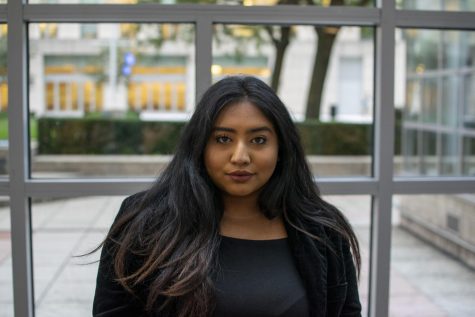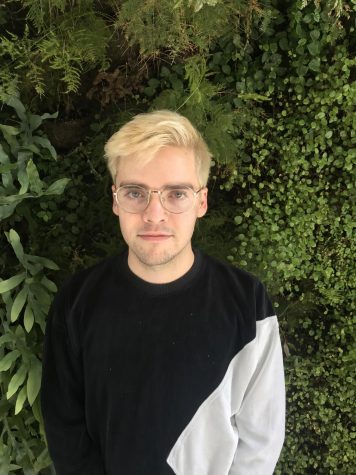STEM Students Resume Research Remotely
After shuttering all research since spring, students and teachers alike are now returning to their labs, although mostly continuing to work remotely.
July 30, 2020
Every summer, students team up with mentors from the natural science and integrative neuroscience departments to research various scientific disciplines. The majority of this research occurs in the labs of Fordham College at Lincoln Center (FCLC); however, due to the current pandemic, students and mentors have had to modify traditional researching operations to allow students to work from home.
Professor Guy Robinson’s Lab
Robinson is a lecturer in biology for the natural science department. He divides his research interests between paleoecology, the study of past ecosystems, and pollen studies. To help him along the way, Robinson oversees 12 students on three projects. He regularly engages with his students remotely, and he has shifted his research away from in-person laboratory work to data analysis.
One project involves the pollen station at Fordham Lincoln Center, which is the only certified aeroallergen monitoring station in New York City. Robinson has acquired 10 years’ worth of data through the pollen station. Currently, two of his students are specifically analyzing the data to ascertain how the construction of the 140 West Building has affected airborne pollen levels. Additionally, another group of five students will be investigating questions related to modern pollen.
Robinson also assembled a separate group of three students who are working on a project that uses data from Fordham’s Louis Calder Center, a property in New York that serves as Fordham’s Biological Field station. The project seeks to correlate the rising carbon dioxide levels with increasing grass pollen concentrations. Additionally, the students will study the contributions of the pandemic on the increased daily grass pollen count.
The final ongoing project is an analysis of the Neotoma Paleoecology Database, which houses data concerning pollen and mammalian fossils spanning the last 5 million years. Two student researchers will be using this database to look at changes in plant and animal distributions over time by studying specific pollen grains.
“Studying the air we breathe and how that changes over days, years and decades is a worthwhile experience for anyone considering public health or the health professions,” Robinson said. He also added that even though paleoecology might not seem “directly relevant” to future careers outside of the field, he said, “I feel that doing original research with real data is good preparation for any future endeavor.”
“A nuanced worldview is essential in any profession where you’ll need to utilize problem-solving skills and deal with uncertainties. Your worldview becomes more nuanced the more you’re exposed to different disciplines within and related to your field,” said one of Robinson’s student researchers, Dina Gomaa, Fordham College at Lincoln Center (FCLC) ’21.
Professors Grace Vernon’s and Mary G. Hamilton’s Lab
Hamilton is a professor emerita of chemistry and Vernon is a professor of biology and the FCLC Pre-Health adviser. With the help of Anusha Imran, FCLC ’22, the team was planning on studying molecules found in the blood of the American lobster, but instead they are taking the summer to review the related literature to prepare for the future experiments in the lab.
In particular, Hamilton, Vernon and Imran aimed to localize where the proteins hemocyanin and superoxide dismutase could be found in lobster cells. They also wanted to study how Brown Shell Disease affects the relationship the molecules have in lobsters.
Imran acquired funding from the Dean’s Summer Research Grant but is unable to perform her experiments because the laboratory is closed.
“The pandemic has really put all the work that I had planned for this summer on a pause and potentially delayed my processes for a year since we are not sure when students can work on their projects in the fall semester,” she said.
Nevertheless, Imran sees the planning she’s doing now with Vernon and Hamilton as a way to streamline the future experiments she will conduct with them. Imran feels that the work she’s doing is highly relevant to her future career in medicine. She believes the investigative process and data analysis her research requires will prepare her to succeed as a physician.
Professor Spyros Efthimiades’ Lab
Efthimiades is an associate professor of physics at FCLC. He generally researches infrared divergences in quantum electrodynamics. This summer, he is mentoring Anoosh Kouyoumdjian, FCLC ’21, with her research in “Biology, Medicine, and Modern Physics.” They will be studying the application of quantum mechanics in X-rays, lasers, radiation therapies and MRIs.
“Because I do theoretical work, the pandemic has not affected my efforts,” Efthimiades said. Kouyoumdjian and Efthimiades meet weekly on Zoom to discuss their theoretical understanding of different scientific functions in quantum mechanics.
Kouyoumdjian originally planned to travel this summer but had to cancel due to the coronavirus outbreak. Still wanting to have a productive summer, she reached out to Efthimiades with a proposal for a summer research project. “Luckily, Professor Efthimiades and I were able to work together to develop a project that could allow me to expand my understanding of physics from home,” she said.
Professor Marie Thomas’ Lab
Thomas is an assistant professor of chemistry who primarily studies ways to dissolve cellulose and chitin in ionic liquids and use ionic liquids as antimicrobials. Because she is unable to meet with her students in a traditional wet lab, she had to temporarily end her researching operations. Instead, she assigns her students various scientific journal articles to read and has them create presentations. Her research group meets weekly on Zoom to discuss the presentations and papers.
“The meetings are helping me understand my own interests, think more critically, pay attention to details I wouldn’t have considered, and helping me be more flexible in creating new ideas,” said one of Thomas’ research students, Reginaflor Glorioso, FCLC ’21. “One is constantly doing these things in research, especially if the research topic in question hasn’t been widely looked at.”
Despite a global public health crisis, students are still progressing forward with a new wave of ideas and remote projects.














